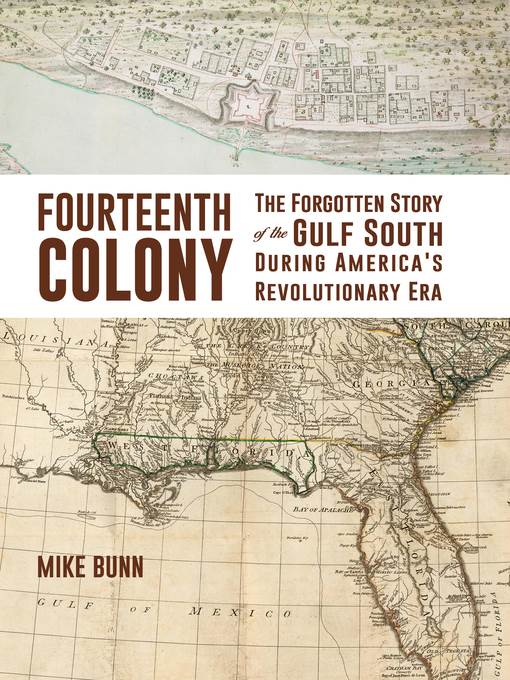
Fourteenth Colony
The Forgotten Story of the Gulf South During America's Revolutionary Era
- اطلاعات
- نقد و بررسی
- دیدگاه کاربران
نقد و بررسی

September 7, 2020
Historian Bunn (Early Alabama) spotlights British West Florida during the American Revolution in this accessible and well-researched account. In 1763, at the end of the Seven Years’ War (known in the U.S. as the French and Indian War), Britain took control of territories on the Gulf Coast formerly claimed by France and Spain, including substantial sections of present-day Alabama, Florida, Louisiana, and Mississippi. West Florida remained loyal to Britain during the Revolutionary War, leading to the influx of thousands of settlers—some loyal to the British crown and some just hoping to avoid the conflict—from Georgia, South Carolina, and England’s Caribbean colonies. Bunn also documents Philadelphia patriot James Willing’s 1778 raid on British forts and plantations in the Natchez area (“a mission of unvarnished plunder”), and Spanish commander Bernardo de Gálvez’s seizure of Mobile and Pensacola in 1781, effectively ending British rule. Though West Florida was formally ceded to Spain in 1783, a series of annexations, uprisings, and military interventions brought the region entirely under U.S. control by 1819. Bunn combines deep scholarship with vivid storytelling, though the subject remains somewhat niche. Still, Revolutionary War completists and regional history buffs will appreciate this comprehensive record of the period.

September 15, 2020
A history of a short-lived British colony on the Gulf Coast in the mid-to-late 1700s. West Florida came into being in 1763 and lasted until 1781, when the Spanish captured it. Originally ceded to the British (along with East Florida) in the wake of the Seven Years' War, the colony included parts of modern-day Florida, Alabama, Mississippi, and Louisiana. From the beginning, its strategic location on the Gulf Coast outweighed its economic contribution to the empire. From there, "they facilitated control of the outlets of a number of major interior river systems and potentially important Gulf and Atlantic ports." However, the fortifications left behind by the French badly needed upgrading, and many were ultimately abandoned. The British also faced the question of how to manage relations with the Native American inhabitants of the territory as well as the former French and Spanish colonists. Bunn, the author of several regional histories, outlines the struggles to set up a government, with regular clashes between the often overmatched royal governors and the colonists, most of whom were struggling despite receiving large land grants. Furthermore, writes the author, "a host of dangerous communicable diseases plagued the new colonists." Attempts to find exportable commodities fell short of expectations except for trade with Natives for deerskins and fur. Bunn aptly summarizes the colony's history, which really comes alive with the arrival of the Revolution. West Florida, isolated from the other colonies, remained officially loyal to the crown--"a lukewarm and conditional loyalty to say the least but a circumstance that, given the situation, Great Britain was happy to have." A raiding expedition along the Mississippi by Philadelphian Thomas Willing and then a campaign by the Spanish governor of Louisiana, Bernardo de Galvez, brought the conflict to West Florida--and ultimately brought the colony under Spanish control. A readable and illuminating exploration of a chapter of American history most readers haven't previously encountered.
COPYRIGHT(2020) Kirkus Reviews, ALL RIGHTS RESERVED.

November 1, 2020
Bunn (Battle for the Southern Frontier, 2008) details an obscure period of Gulf South history. For twenty years, 1763-1783, the colonies of East and West Florida were under British control. Bunn provides a wealth of information about aspects of this change in power and the lives of the colonists. In addition to the overarching narrative of how the British gained the land from the French and Spanish only to lose it in the aftermath of the American Revolution, there is plenty of fine detail. Chapters devoted to the day to day life of settlers and how they supported themselves share space with sections on West Florida's loyalty to the crown throughout the war and how Spanish forces supporting the Americans ultimately seized the territory. Bunn also describes how the arrival of the British changed the power dynamic that had existed between other European colonizers and Indigenous groups (referred to in the text by English names such as Creek rather than Muscogee), creating new relationships and tensions. Recommended for those with interest in the region and its colonial history.
COPYRIGHT(2020) Booklist, ALL RIGHTS RESERVED.

December 4, 2020
Once upon a time Great Britain had 14 American colonies, not 13. The 14th colony was a latecomer. And it was short-lived. West Florida was a prize, like Canada, from the defeated French and Spanish at the end of the Seven Years War in 1763. The new British colony stretched from the Apalachicola to the Mississippi. Its boundaries encompassed large portions of the present states of Louisiana, Mississippi, Alabama, and Florida, situated between the Spanish and French colonies of East Florida and Louisiana, respectively. Pensacola, the territory's largest settlement, became the colonial capital while Mobile, with its natural bay, became the major shipping point. But it failed to establish a stable, functioning government, as its sister colonies along the Atlantic seaboard did. Bunn (director, Historic Blakeley State Park, Spanish Fort, AL; Alabama from Territory to Statehood) explains how the colony struggled to attract settlers and to become economically viable. Weak militarily, West Floridians were generally uninterested in the Americans' revolution, despite two failed filibuster expeditions from their sister colonies. The author details how the British lost the territory when the Spanish, an American ally, easily reconquered it in 1781. VERDICT An excellent, well-researched introduction to a long-forgotten British colony of America's Revolutionary era; for general readers.--Glen Edward Taul, formerly with Campbellsville Univ., KY
Copyright 2020 Library Journal, LLC Used with permission.




دیدگاه کاربران